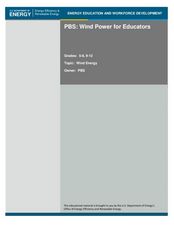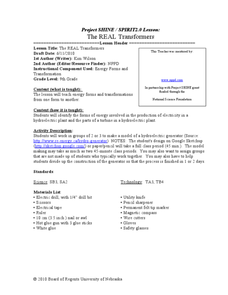It's About Time
Petroleum and Your Community
I was going to write a joke about oil, but it seemed crude. This lesson starts with a comparison of where the US gets oil from and how that has changed over time. After analyzing the data, scholars create a graph and use the Internet to...
Science Friday
Wind Power
Blow away the competition with a activity about wind power and turbines. Groups build windmills to test how the size of blades affect the amount of work done. The scholars build a variety of blades and collect data on how each type...
Curated OER
Life Unplugged
Learners explore renewable and non-renewable energy sources, discuss how each source was created, and identify and sketch out the cycle of energy for each renewable source.
Curated OER
To Renew, or Not to Renew
Students explore the various types of renewable energy. After reading articles, they discover the advantages and disadvantages of renewable energy. They also explore the challenges to switch over to using more and more renewable energy...
Curated OER
Hot Time in the Classroom
Fourth graders, in groups, examine how temperature is a measure of the average translational kinetic energy.
Curated OER
CO2: How Much Do You Spew?
Students analyze the energy consumption of a household to see the amount of carbon dioxide they add to the atmosphere each year. In this energy consumption lesson students calculate carbon emissions and discuss sources of carbon...
Curated OER
A Hilly Ride
Fifth graders investigate situations that show how kinetic and potential energy are exchanged. They determine how friction is a source of energy transfer from kinetic to thermal energy by experimenting with a car and track. They answer...
Curated OER
Student Power Use
Students calculate the energy usage in their bedroom. In this physics lesson plan, students compare their energy consumption during school days and weekends. They recommend ways to save energy.
Curated OER
Wind Power for Educators
Students explore wind power as a renewable resource. In this wind power lesson students build models of wind turbines and experiment with different changes to see if it increases efficiency.
Curated OER
Do Plants Eat?
Students explain that photosynthesis is a process that plants use to convert light energy into glucose. They summarize photosynthesis as a chemical process in which the plant uses carbon dioxide and water to form glucose and oxygen.
Curated OER
Schools and Cells
Fourth graders create analogies in poster format between a cell's organelles and their school. For example, 4th graders coul say a cell's mitochondria is like the cafeteria, both are a source of energy.
Curated OER
Making Things Move
For this sources of energy worksheet, students draw a picture to illustrate each of four sources of power: gravity, wind, electricity and manpower.
Curated OER
Sustainable Choices
Learners examine energy use and the different construction materials used in their home. In this sustainable choices instructional activity students study different materials and what a sound environmental choice would be.
Curated OER
Walk a Mile for a Burger?
Students are introduced to the pedometer, and use this tool to associate physical activity (physical energy) with calories burned (chemical energy). They comprehend the making and burning of energy.
Curated OER
Harvesting Oil from the Earth
Fourth graders research sources of fossil fuels especially oil while determining how scientists take core samples from an Earth model. They look at oil consumption and production in the US and throughout the world.
Curated OER
Robot Earth
Middle schoolers construct a simple robotic energy transformer. In this space science lesson, students explain how energy is transformed from one form to another. They identify the different uses of robotic devices.
Curated OER
Food Chains
Students create their own food chains on Kidspiration starting from the energy of the sun and what it creates. In this food chains lesson plan, students learn about how insects eat plants and so on.
Curated OER
Cosmic Rays
Pupils study cosmic rays and the energy behind them. In this atmospheric instructional activity students complete a cosmic ray telescope project.
Curated OER
Balloon Ball Bounce
Students explore the rebound of balls. In this energy conversion lesson, students explore the physics behind the rebound of various types of sports balls. Through the experimental design process using balloons, students investigate and...
Curated OER
Plugged in to CO2
Students use a meter to measure the energy used and carbon produced by electronics and appliances. In this environmental science and technology lesson, students use a Kill-A-Watt meter to determine the electricity used by everyday...
Curated OER
The REAL Transformers
Ninth graders create a model of a hydroelectric generator. In this physics lesson, 9th graders discuss how energy can be transformed from one form to another. They make a flow chart for different energy generating plants.
Curated OER
Experiments with Photovoltaic Cells
Students explain how sunlight is converted to electricity. In this series of physics lesson, students study how varying the characteristics of the light source affect photovoltaic cells. They research their different uses in other...
Curated OER
How is heat transferred through conduction?
Fifth graders observe different types of conductors. They answer orally about the conduction of heat energy with 100% accuracy. Students investigate some materials that conduct heat much better than others, and poor conductors can...
Curated OER
Radiation: To Worry or Not to Worry
Young scholars distinguish safe forms of radiation from those that are dangerous. Students watch a video about sources of radiation encountered every day. Young scholars estimate their own annual radiation exposure.
Other popular searches
- Alternative Energy
- Alternative Energy Sources
- Alternative Fuels
- Alternative Energy Worksheet
- Renewable Energy Resources
- Alternative Energy Forms
- Alternate Energy Sources
- Renewable Energy Sources
- Sources of Energy
- Types of Energy Sources
- Alternative Energy Resources
- Exploring Alternative Energy

























